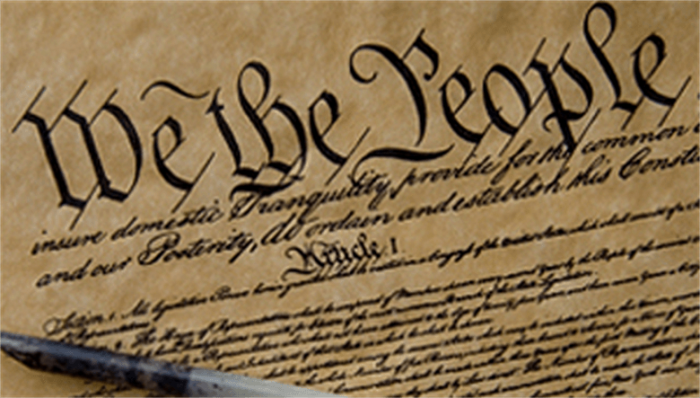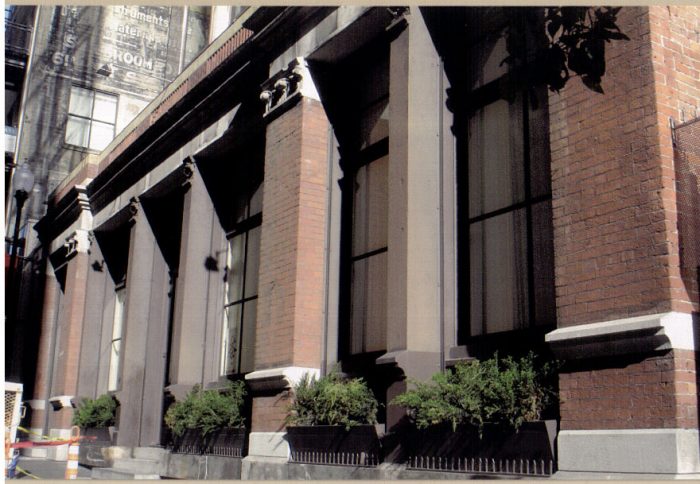
With respect to the United States legal and political system, the expressed powers (also called enumerated powers or delegated powers) are those powers and capacities explicitly granted to Congress in the Constitution. The expressed powers are listed in Article I, Section 8 of the Constitution of the United States, and consist of different issues that Congress has explicit authority to make legislation over. Expressed powers are contrasted with reserved powers, those powers and capacities that only individual states possess.
The different expressed powers, in the order they are listed in the constitution, are as follows:
- The power to levy and collect taxes, duties, imports, and excises
- The power to borrow on the credit of the United States
- The power to regulate international and interstate commerce and all financial laws
- To coin money
- Establish laws of naturalization (how people become citizens)
- Establish post offices and roads
- Promote sciences and art through patents and copyrights
- To create federal court systems
- To punish offenses on the “high seas” ( a big problem in the 18th century)
- To declare war, raise/support an army, and pass laws governing those armed forces
- Make any laws that are “necessary and proper” to fulfill these powers
In this article, we will go through the major expressed powers and offer some examples of each. We will also cover the limitations on Congress’ power and current debates on the interpretation of the expressed powers in the Constitution

Credit: U.S. Air Force, Public Domain
Powers Involving Money
Taxes
According to the list of enumerated powers, Congress has the authority to set tax rates and pass laws involving taxation. To be clear, individual states also have the power to set certain taxes, but any taxation laws passed by states must be in line with federal laws on taxation.
Borrow Money
Only Congress has the power to borrow money from foreign nations on behalf of the United States’ credit. Likewise, only Congress has the power to set guidelines regarding the lending of US money to foreign entities. This does not mean that individuals and states cannot borrow money from foreign entities, but that only Congress can borrow money on behalf of the United States.
Coin Money

The federal mint in San Francisco which first opened in 1854. Credit: Tony the marine via Wikipedia CC-BY-SA 3.0
According to Article I, section 8, Congress has the sole authority to create and regulate currency. This means that only the federal government can handle the creation and distribution of new currency, such as coins and bills. Congress is also tasked with fighting currency counterfeiting.
Regulate Commerce
The expressed powers also indicate that Congress has the authority to regulate international and interstate commerce. This means that Congress can pass laws regarding the international or interstate transfer of goods and services. Congress also has the authority to set uniform national laws on declaring bankruptcy.
Powers Involving War and Crime
Raise and Maintain a Military
According to Article I, Section 8 of the Constitution, Congress has the authority to use tax funds to raise and maintain any military outfits. Only Congress can delegate the funds towards funding a national army. This means that Congress also has the power to pass any law regarding the regulation of military bodies such as the Army, Navy, and Air force. this includes any laws on military conduct and the capture of foreign bodies and vessels, laws on treason, and laws on aiding foreign combatants.
Declare War
Congress also has the sole authority to declare war on foreign nations. Although the president is the commander and chief of the nation’s military branches, Congress has the final say on whether we declare war and is
supposed to be the only body that can call for direct military action, be it domestically or internationally. While the framers of the Constitution clearly intended for Congress alone to declare war, in practice, some presidents throughout American history has circumvented Congress and declared war. For example, President Harry Truman bypassed Congress to declare war on Korea. Unfortunately, many presidents through the decades have attempted to bypass Congress to declare war.
Punish Offenses on the “High Seas”
During the time of the Framers, piracy on the ocean was a huge problem for several nations. Oceans and other international bodies of water have historically been a ‘grey area’ of legal jurisdiction due to several competing national claims on bodies of water. The Constitution was written to give Congress the power to punish piracy on the high seas in areas where legal jurisdiction may not have been previously clear.
Powers Involving Institutions
Patents and Copyrights
According to the constitution, Congress has the authority to raise funds to promote the arts and sciences and to safeguard those discoveries via the granting of copyrights on works and patents on inventions and other scientific procedures. The point of patents and copyrights is to give inventors and artists the exclusive rights to their writings and discoveries.
Roads and Post Offices
The Constitution also grants Congress the authority to construct a system of roads for transportation and establish federal post offices for communication.
Powers Involving Laws and Legal Processes
Naturalization
Congress has the sole authority to define what it means to be a US citizen and implement a process for acquiring citizenship. An example of Congress exercising this power was the Child Citizenship Act of 2000 which introduced a streamlined naturalization process for children adopted internationally. According to this law, any child under the age of 18 that is adopted by a U.S citizen and resides in their custody is automatically a US citizen when legally adopted.
Governing the District of Colombia

The official seal of Washington, D.C. The District of Colombia is a separate territory under the sole jurisdiction of the federal government. Credit: Public Domain
Part of the enumerated powers makes the District of Colombia the official home of the federal government and give them direct power over the laws therein. This means that Washington D.C. is a region that is under the direct control of the federal government and is separate from every other state in the union.
“Elastic Clause”
The final expressed power; that Congress has the power to pass any laws “necessary and proper” for them to exercise the listed powers, is sometimes called the “elastic clause.” The elastic clause says that Congress can pass any laws that it needs to to be able to effectively enact their powers enshrined in the Constitution. The elastic clause was introduced by the Framers on account of the fact that it is impossible to make an exhaustive list of all the government’s powers. First off, there would be too many to list and second, the Framers wanted to make a government that could change and adapts to the times. The Elastic clause gives Congress the freedom to make laws to exercise their powers.
Limitations on Congress’ Power
In addition to the expressed powers, the Constitution also outlines powers that only the states can have. Reserved powers (also called residual powers or residuary powers) are those powers neither explicitly granted nor forbidden by law to any governmental body. According to the Constitution, the reserved powers are granted solely to the individual states. The tenth amendment of the Bill of Rights indicates that any powers not expressly granted to Congress are left to the individual discretion of the states.
For example, the reserved powers imply that individual states have the power to regulate some forms of commerce between cities within their own borders, and can pass laws regarding employment and schools. The only requirement is that any laws passed by the individual states cannot be in violation of federal laws on the matter.
Historically, many Supreme Court cases have involved challenges to federal authority based on the tenth amendment. For example, in Printz v. United States (1997) the Supreme Court ruled that certain laws regulating the sale of firearms in the state violated portions of the tenth amendment since it forced the state to participate in a federal administrative program. The point of reserved powers is to safeguard democracy by ensuring the people of a particular state have a determinate say in what happens in the state.
Debates on Interpretations of the Expressed Powers
The exact interpretation of the expressed powers in the Constitution is a matter of current debate. Much of the debate among Constitutional scholars surround the proper interpretation of the phrase “necessary and proper” in the elastic clause. According to strict constitutionalists, Congress the clause means that Congress can only pass laws only if the inability to pass it would make it impossible for them to apply one of their enumerated powers. Loose constitutionalists, on the other hand, believe it is largely up to Congress and not the courts to determine which means are “necessary and proper.”
An example routinely brought up in classes on legal theory to illuminate the distinction between these two views on interpreting the Constitution is the Supreme Court case of McCulloch v. Maryland (1819). The Constitution does not explicitly forbid the establishment of a national bank. In 1819, the federal government opened a national bank in Baltimore, Maryland. The state government of Maryland then imposed a tax on the national bank as a way to drive it out of business. James McCulloch, a teller at the bank, refused to pay the state tax. Eventually, the case reached the Supreme Court. The court ruled in favor of McCulloch and stated that the state of Maryland does not have to power to impose taxes on an arm of the federal government. According to Chief Justice John Marshall who wrote the majority opinion on the case, the power of Congress to establish a national bank could be derived from the Elastic Clause in Article 1, Section 8 of the Constitution, namely the provision that Congress has the authority to regulate currency and interstate commerce and banking.








